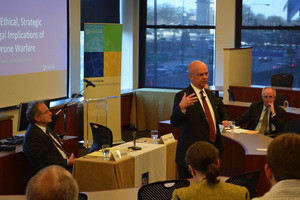 Gen. Michael Hayden (USAF, ret.), former director of the CIA, speaks at the Kroc Institute's March 19-21 conference on drone warfare.
Gen. Michael Hayden (USAF, ret.), former director of the CIA, speaks at the Kroc Institute's March 19-21 conference on drone warfare.
At the invitation of Notre Dame’s Kroc Institute, several dozen leading thinkers on national and international security and peace convened at the Notre Dame Commons in Chicago on March 19-21 to address “The Ethical, Strategic & Legal Implications of Drone Warfare.”
The gathering responded to “the urgent need for reasoned dialogue on the increasing use of combat drones by the United States,” said conference organizer David Cortright, director of policy studies at the Kroc Institute. He designed the effort “to push toward greater international consensus on ethical and legal standards for the use of these weapons.”
Presenters and participants included both supporters and critics of the U.S. drone program, including high-level military officers, international law experts, policy analysts, ethicists, theologians, and representatives of policy agencies and civil and human rights organizations. Read the special issue of Peace Policy on the drone warfare conference »
The opening address, chaired by Kroc Institute Director Scott Appleby, featured General Michael Hayden (USAF, ret.), former director of the National Security Agency and the CIA; and Christof Heyns, UN special rapporteur on extrajudicial, summary, or arbitrary executions and professor of human rights law at the University of Pretoria.
A panel discussion on ethics and drone warfare, chaired by Atalia Omer, assistant professor of religion, conflict, and peace studies at the Kroc Institute, featured Jennifer Welsh, professor of international relations at Oxford University and co-director of the Oxford Institute for Ethics, Law and Armed Conflict; Martin L. Cook, professor of professional military ethics at the U.S. Naval War College; and Rev. Susan Thistlethwaite, professor of theology and former president of the Chicago Theological Seminary. Respondents were Gerard F. Powers of the Kroc Institute and Daphne Eviatar of Human Rights First.
The panel discussion on legal challenges of drone warfare, chaired by Hal Culbertson, executive director of the Kroc Institute, featured Karen J. Greenberg, director of the Center on National Security at Fordham University; Mary Ellen O’Connell, the Robert and Marion Short Chair in Law at Notre Dame Law School and research professor at the Kroc Institute; and Pardiss Kebriaei, senior staff attorney at the Center for Constitutional Rights. Respondents were Ambassador Lincoln Bloomfield, Jr., of the Stimson Center and Naureen Shah of Columbia University.
A panel on the security implications of drone warfare, chaired by Rachel Bronson of the Chicago Council on Global Affairs, led with an address by General James E. Cartwright (USMC, ret.), former Vice Chairman of the Joint Chiefs of Staff and former Commander of U.S. Strategic Command. Panelists included Peter Bergen, director of the National Security Studies Program at the New America Foundation and CNN’s national security analyst, and Audrey Kurth Cronin, professor of public policy at George Mason University and senior research associate at Oxford. Respondents were Micah Zenko, Douglas Dillon Fellow in the Center for Preventative Action at the Council on Foreign Relations, and Michael Desch, chair and professor of political science at the University of Notre Dame.
A panel on civil rights and human rights impacts of drone warfare, chaired by George A. Lopez of the Kroc Institute, featured Mary L. Dudziak, director of the Project on War and Security in Law, Culture and Society at Emory University School of Law; Rafia Zakaria, board member of Amnesty International and director of the Muslim Women’s Defense Fund of Indiana; and Chris Woods, Senior Reporter at the Bureau of Investigative Journalism. The respondent was Douglass Cassel of Notre Dame Law School.
The Kroc Institute plans to produce and distribute web and print materials that summarize key findings and policy recommendations. A number of panelists will contribute to a book manuscript on drone warfare.
Contact: David Cortright, 574-631-8536, dcortrig@nd.edu